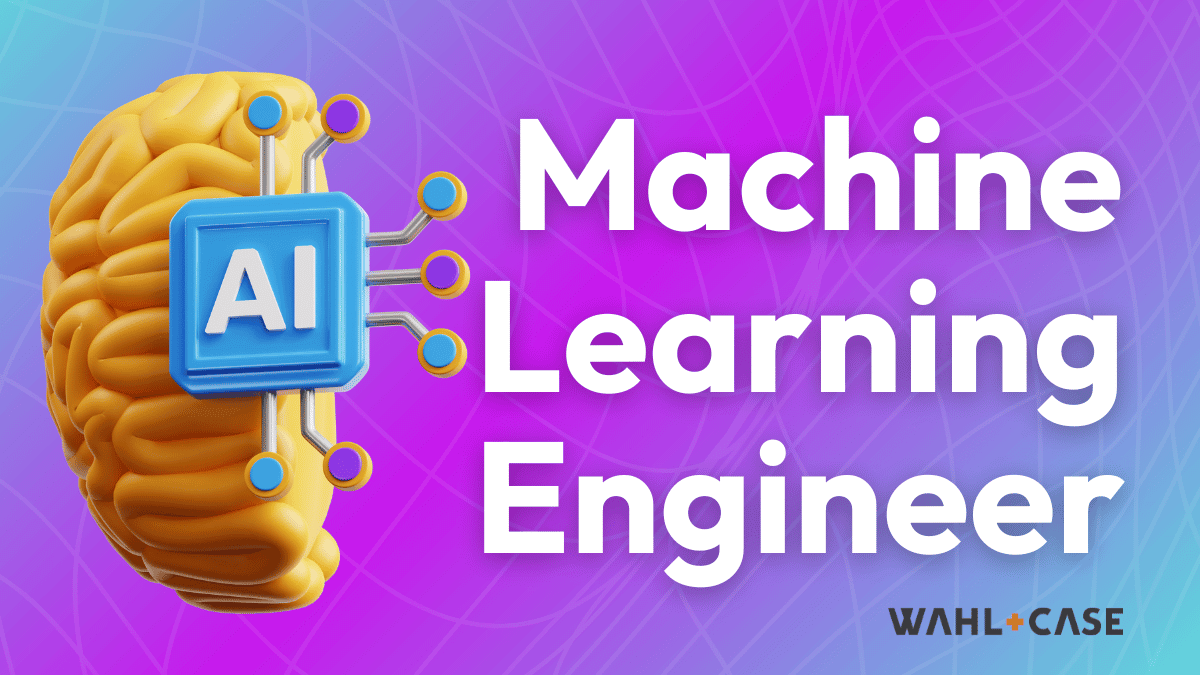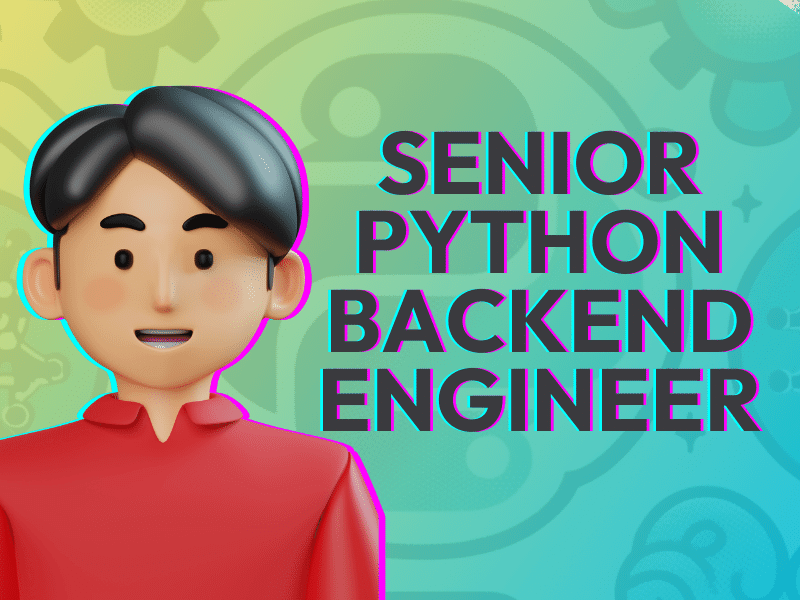AI/Machine Learning Engineer - Position Explained
Are you considering a career as an AI/Machine Learning Engineer?
Or maybe you're already fighting natural stupidity as an MLE and want new weapons to wage the war?
You've come to the right place!
In this article, I’ll cover everything you need to know about being an AI/Machine Learning Engineer, from the role's definition to the skills required for success to the potential career paths available.
I will also answer frequently asked questions to help you in your AI journey.
At Wahl+Case, we have helped hundreds of people land jobs at some of the biggest names in Tech.
If you're ready to learn all about being an AI/Machine Learning Engineer, read on!
What is an AI/Machine Learning Engineer?
As an AI/Machine Learning Engineer, your main responsibility is to design, develop, and deploy machine learning models and AI solutions for various applications.
Your day-to-day tasks will involve:
Analyzing large datasets and determining appropriate machine learning algorithms for the given problem
Designing, training, and optimizing machine learning models
Collaborating with other teams, like data scientists, software engineers, and product managers, to integrate AI and machine learning capabilities into products or services
Ensuring that AI/ML solutions are secure, scalable, and efficient
Continuously evaluating and improving the performance of AI/ML models
What Opportunities does an AI/Machine Learning Engineer have?
The demand for AI/Machine Learning Engineers is peaking now with the onslaught of tools from companies like OpenAI, Google, and like literally every single company.
As I am writing this Squarespace is pushing me to to use their new generative AI writing assistant.
Let’s explore some of the opportunities available for you in various industries.
INDUSTRIES WITH HIGH DEMAND FOR AI/MACHINE LEARNING ENGINEERS
Technology and Software: Tech companies leverage AI and machine learning to power their products and services, making AI/Machine Learning Engineers crucial to their success.
Finance: Banks, investment firms, and insurance companies require AI/Machine Learning Engineers to help design and develop AI-driven tools for risk assessment, fraud detection, and customer analytics.
Healthcare: Our client Molcure, is leveraging AI to discover treatments previously unthought of by human minds. This is only one example of the ways we can use these tools in healthcare
Retail and E-commerce: Companies in this sector use AI and machine learning for personalized marketing, recommendation systems, and supply chain optimization. AI/Machine Learning Engineers play a vital role in these efforts.
Requirements for an AI/Machine Learning Engineer
To excel as an AI/Machine Learning Engineer, you need a mix of technical and soft skills.
Technical Skills
Programming languages: You should have proficiency in programming languages like Python, R, or Java; all used in AI and machine learning applications.
Machine learning frameworks: Familiarize yourself with machine learning frameworks such as TensorFlow, PyTorch, or scikit-learn, which enable you to develop and deploy machine learning models.
Data manipulation and analysis: A strong understanding of data manipulation and analysis techniques, such as using Pandas or NumPy in Python, is essential for working with large datasets and preparing data for machine learning algorithms.
Deep learning and AI concepts: You need a solid grasp of AI concepts, such as artificial neural networks, reinforcement learning, and natural language processing, to develop cutting-edge AI solutions.
Soft Skills
Communication: You will collaborate with different teams as an AI/Machine Learning Engineer. You need strong communication skills to convey your ideas and solutions effectively.
Problem-solving: Being able to approach complex problems and find the most efficient solution is essential. Break down problems into smaller components and systematically analyze each part.
Critical thinking: Critically assess the design and performance of AI/ML models, question assumptions, and draw valid conclusions based on the available information.
Attention to detail: Ensuring accuracy in your AI/ML model design and implementation by having an eye for detail.
Career Progression
As an AI/Machine Learning Engineer, you can progress your career in multiple directions.
Here are potential career paths:
Senior AI/Machine Learning Engineer: With more experience, you can move up to a senior role, where you will tackle more complex projects and mentor junior engineers.
AI/ML Researcher: In this role, you'll focus on developing new algorithms and techniques to advance the field of AI and machine learning.
Data Scientist: If you're interested in focusing more on data analysis and interpretation, you can transition into a Data Scientist role, where you'll use statistical methods and machine learning to extract insights from data.
AI/ML Team Lead or Manager: If you're more inclined toward leadership, you can move into a Team Lead or Manager role, overseeing a team of AI/Machine Learning Engineers and driving the overall AI/ML strategy for an organization.
To explore available AI/Machine Learning Engineer positions, message us here!
How to Become an AI/Machine Learning Engineer: Your Path to Success
A career as an AI/Machine Learning Engineer is an exciting and rewarding journey.
Here is a step-by-step guide to help you navigate the path to becoming an AI/ML Engineer.
Step 1: Acquire the Necessary Educational Background
Typically, AI/Machine Learning Engineers hold a bachelor's degree in computer science, engineering, mathematics, or a related field.
Pursuing a degree in one of these disciplines will provide you with a solid foundation in programming, algorithms, data structures, and other core concepts essential for your career.
Step 2: Learn Relevant Programming Languages
Proficiency in programming languages such as Python, R, or Java is crucial for AI/ML Engineers.
You can take courses, attend workshops, or engage in self-study to master these languages. Make sure to practice your programming skills through hands-on projects, as this will help you build a strong portfolio to showcase your expertise.
Step 3: Gain Familiarity with Machine Learning Frameworks and Libraries
As mentioned above, as an AI/Machine Learning Engineer, you'll need to be well-versed in machine learning frameworks such as TensorFlow, PyTorch, and scikit-learn.
Familiarize yourself with these tools by completing online tutorials, courses, or attending workshops. Additionally, become comfortable with data manipulation and analysis libraries like Pandas and NumPy.
Step 4: Develop a Strong Foundation in AI and Machine Learning Concepts
To excel in your career, you should have a solid understanding of AI and machine learning concepts, such as artificial neural networks, reinforcement learning, and natural language processing. You can acquire this knowledge through online courses, textbooks, or conferences/workshops.
Step 5: Work on Personal Projects and Gain Practical Experience
Hands-on experience is invaluable in the field of AI/Machine Learning.
Develop your own projects or collaborate with others to apply your skills in real-world scenarios. This will build a strong portfolio and demonstrate your abilities to potential employers.
Step 6: Consider Pursuing Advanced Education or Certifications
A master's or Ph.D. in a related field can give you a competitive edge. Additionally, obtaining certifications in specific AI/ML frameworks or tools can further demonstrate your commitment.
Step 7: Network and Stay Current with Industry Developments
Connect with fellow AI/Machine Learning Engineers at networking events, meetups, and in online forums. Staying up-to-date with the latest AI/ML advancements is essential to your success, so make sure to follow industry blogs, attend conferences, and participate in online communities.
Step 8: Apply for AI/Machine Learning Engineer Positions
With a strong foundation in AI/ML concepts, practical experience, and a robust portfolio, you're ready to apply for AI/Machine Learning Engineer positions. Tailor your resume and cover letter to highlight your relevant skills and experience, and leverage your professional network to discover job opportunities.
Need help applying?
Contact us here to learn about current AI/Machine Learning Engineer job opportunities!
Alternative Titles
AI/Machine Learning Engineers have different titles depending on the company or industry.
Some alternative titles include:
AI Engineer
Machine Learning Scientist
AI Research Engineer
ML Systems Engineer
Titles may vary, but the core responsibilities often remain similar across these roles.
Differences Between AI/Machine Learning Engineers in Japan and the West: What It Means for You
While the core responsibilities and skills required for an AI/Machine Learning Engineer are similar worldwide, there are key differences to consider when comparing the profession in Japan and the West. Cultural, language, and market differences can impact the job landscape, opportunities, and challenges you face as an AI/Machine Learning Engineer.
Language and Communication
One of the most significant differences you'll encounter is the language barrier.
In Japan, proficiency in the Japanese language is often required, even for technical roles like AI/Machine Learning Engineers. You may need business-level fluency, and knowledge of industry-specific terminology in Japanese is a must have.
Business Culture
Japanese business culture is known for its formality, hierarchical structure, and respect for authority.
As an AI/Machine Learning Engineer working in Japan, you'll need to adapt to this environment, where decision-making may be slower and more consensus-driven.
AI/ML Adoption and Market Differences
AI/ML adoption in Japan has historically been slower compared to Western countries due to concerns about security, data privacy, and a preference for more traditional methods. However, this is changing as Japanese companies increasingly embrace AI and machine learning technology to enhance their efficiency and competitiveness. As a result, the demand for skilled AI/Machine Learning Engineers like you is on the rise, although the market may still be smaller than in the West.
Job Opportunities and Networking
When looking for job opportunities as an AI/Machine Learning Engineer in Japan, networking and establishing connections can be more crucial for you than in the West, as personal relationships are highly valued in Japanese business culture. Joining local tech meetups, industry events, and online communities can help you expand your network and discover new opportunities.
Message us here to explore AI/Machine Learning Engineer positions that suit your needs in Japan!
FAQ
Q: What is the difference between an AI/Machine Learning Engineer and a Data Scientist?
A: While both roles work with data and machine learning, an AI/Machine Learning Engineer focuses on designing, developing, and deploying AI/ML models, while a Data Scientist focuses more on analyzing and interpreting data to extract insights and make predictions.
Q: What industries do AI/Machine Learning Engineers work in?
A: AI/Machine Learning Engineers can work in various industries, including tech, finance, healthcare, retail, and more. Any industry that leverages AI and machine learning technologies can benefit from the skills of an AI/Machine Learning Engineer.
Q: What kind of education is needed to become an AI/Machine Learning Engineer?
A: A bachelor's degree in a related field, such as computer science, engineering, or mathematics, is often required for an AI/Machine Learning Engineer role. However, some companies may consider candidates with relevant experience and a strong portfolio of AI/ML projects. Additionally, certifications in specific AI/ML frameworks or tools can increase your chances of landing a job in this field.
Q: Do I need a certification to become an AI/Machine Learning Engineer?
A: While a certification is not always required, having an AI/ML certification from a reputable provider, like TensorFlow, PyTorch, or Coursera, help you stand out in the job market and demonstrate your expertise.
Q: Can I become an AI/Machine Learning Engineer without a degree?
A: While many AI/Machine Learning Engineers hold degrees in computer science, engineering, or related fields, it's not uncommon for professionals to transition into this role from other technical backgrounds or through self-study and practical experience. Demonstrating your skills and knowledge through certifications, projects, or hands-on experience can help you break into this field without a degree.
Q: How do I stay up to date with the latest AI/ML technologies and trends?
A: You can follow industry blogs, attend conferences and webinars, participate in online communities, or complete relevant training and certification courses to stay current with the latest developments in the field.
Q: Does this sound exciting to you?
A: Message us using this link to learn what AI/Machine Learning Engineer positions are open right now!
Curious about other roles in the tech industry? Explore more resources and articles on our blog to find out about various positions and how they contribute to the exciting world of technology.




























